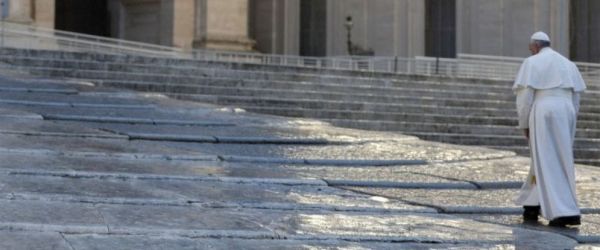Today I would like to pause on that dimension of hope that is vigilant waiting. The theme of vigilance is one of the guiding threads of the New Testament. Jesus preaches to his disciples: “Let your loins be girded and your lamps burning, and be like men who are waiting for their master to come home from the marriage feast, so that they may open to him at once when he comes and knocks” (Lk 12:35-36). In this time that follows the Resurrection of Jesus, in which peaceful moments continually alternate with painful moments, a Christian never rests. The Gospel recommends being as servants who never go to sleep until their master has returned. This world requires our responsibility, and we accept all of it and with love. Jesus wants our existence to be laborious, that we never lower our guard, so as to welcome with gratitude and wonder each new day given to us by God. Every morning is a blank page on which a Christian begins to write with good works. We have already been saved by Jesus’ redemption, however, now we await the full manifestation of his power: when at last God will be everything to every one (cf. 1 Cor 15:28). Nothing is more certain, in the faith of Christians, than this “appointment”, this appointment with the Lord, when he shall come. And when this day arrives, we Christians want to be like those servants who spent the night with their loins girded and their lamps burning: we must be ready for the salvation that comes; ready for the encounter. Have you thought about what that encounter with Jesus will be like, when he comes? It will be an embrace, an enormous joy, a great joy! We must live in anticipation of this encounter!
Christians are not made for boredom; if anything, for patience. We know that hidden in the monotony of certain identical days is a mystery of grace. There are people who with the perseverance of their love become as wells that irrigate the desert. Nothing happens in vain; and no situation in which a Christian finds himself is completely resistant to love. No night is so long as to make us forget the joy of the sunrise. And the darker the night, the closer the dawn. If we remain united with Jesus, the cold of difficult moments does not paralyze us; and if even the whole world preached against hope, if it said that the future would bring only dark clouds, a Christian knows that in that same future there will be Christ’s return. No one knows when this will take place, but the thought that at the end of our history there will be Merciful Jesus suffices in order to have faith and not to curse life. Everything will be saved. Everything. We will suffer; there will be moments that give rise to anger and indignation, but the sweet and powerful memory of Christ will drive away the temptation to think that this life is a mistake
After we have met Jesus, we cannot but examine history with faith and hope. Jesus is as a house, and we are inside, and from the windows of this house we look at the world. For this reason we do not close in on ourselves, we do not long with melancholy for a supposedly golden past, but we look ever forward, to a future that is not only our handiwork, but that above all is a constant concern of the providence of God. All that is lacklustre will one day become light.
Let us consider that God never contradicts himself. Never. God never disappoints. His will in our regard is not nebulous but is a well-defined salvific plan: God “desires all men to be saved and to come to the knowledge of the truth” (1 Tim 2:4). Therefore let us not abandon ourselves to the flow of events with pessimism, as if history were a runaway train. Resignation is not a Christian virtue.
As it is not Christian to shrug one’s shoulders or bow one’s head before a seemingly inescapable destiny.
One who brings hope to the world is never a submissive person. Jesus recommends we not await him with idle hands: “Blessed are those servants whom the master finds awake when he comes” (Lk 12:37). There is no peacemaker who at the end of the day has not compromised his personal peace, taking on the problems of others. A submissive person is not a peace-builder but is an idler, one who wants to be comfortable. Meanwhile a Christian is a peacemaker when he takes risks, when he has the courage to take risks in order to bring good, the good which Jesus has given us, given us as a treasure.
In each day of our life, we repeat that invocation that the first disciples, in their Aramaic language, expressed with the words Marana tha, and which we find in the last verse of the Bible, “Come, Lord Jesus” (Rev 22:20). It is the refrain of every Christian life: in our world we need nothing other than Christ’s caress. What a grace if, in prayer, in the difficult days of this life, we hear his voice which responds and assures us: “Behold, I am coming soon” (Rev 22:7)!
[Pope Francis, General Audience, 11 October 2017]












